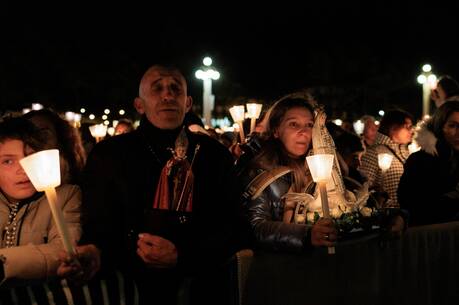John McCain has a big problem. The economy is bad and when the economy is bad it tends to push all other issues off the stage. And, whenever McCain has to so much as discuss the economy, he looks like someone just put pins in his eyes. His answers are vague or forced, and he seems to lack a basic capacity for empathy with those who are struggling financially. He desperately needs a vocabulary with which to connect with voters concerned about paying their bills. Last October, former Bush speechwriter Michael Gerson wrote an op-ed in the Washington Post in which he argued that there are "two belief systems contending for the soul of the Republican Party...libertarianism and Roman Catholic social thought." This is an easy call for a candidate facing a general election: McCain should embrace Catholic social thought. There are many problems with libertarianism, but the essential political problem is that at a time when people are hurting, Americans want their government to do something about it. Herbert Hoover’s obstinate persistence in laissez-faire policies earned him an early retirement while Franklin Roosevelt bold policy experiments earned him four consecutive terms. Even George W. Bush, who put the "laissez" back into laissez-faire, has been forced by the financial crisis to try new regulatory schemes, anathema to libertarians. McCain is not a Catholic, and it would be bizarre at best for him to start sounding like Pope Benedict XVI. But, he needs to borrow the moral framework for addressing economic issues from the Church, adapt it to the American context and the free market principles of his party (to the extent that these are reconcilable) and articulate a vision of an American economy that works for everybody, not just for those who are already wealthy. In that same essay, Gerson wrote, "Presidential candidates -- unlike members of Congress from gerrymandered districts in which nearly everyone looks and thinks like themselves -- must appeal broadly. No presidential aspirant can win without a message of solidarity, a vision of justice and hope that includes the whole country. A Republican Party that does not offer a robust agenda on health care, education reform, climate change and economic empowerment will fade into irrelevance." Such a message of solidarity, such a vision of justice and hope already exists in the long tradition of papal social teachings dating back to Pope Leo XIII’s seminal encyclical Rerum Novarum. In the weeks before the 1932 election, Franklin Roosevelt was tutored in the essentials of Catholic social thought by his aide Ed Flynn and incorporated references to Pope Pius XI’s Quadragemiso Anno in a major speech in Detroit. He also quoted prominent Jewish and Protestant thinkers. He articulated a concern for the Common Good that the laissez-faire policies of his predecessor could not address. And, Roosevelt won in a landslide. Michael Sean Winters
McCain, Catholics and the Economy
Show Comments ()
1
Comments are automatically closed two weeks after an article's initial publication. See our comments policy for more.
16 years 1 month ago
The problem McCain or the Republican party has with Catholic social teaching is that they look at the economy in terms of assets and loses, that is money, while Catholic social teaching looks at the economy in terms of human beings and their welfare. If money is the starting point you end up in a different place than if people are the starting point. As the US Bishops asked in Economic Justice for All: What does the economy do for the people, especially for the poor? Anyone who wants to see how Catholic social teaching is applied to specific legislation today can go to www.networklobby.org, the web page of NETWORK a National Catholic Social Justice Lobby. Unfortunately, Network's recommendations are seldom supported by conservatives. It is interesting that the basic principles of economic justice first enunciated by Leo XIII one hundred years ago have been enacted for the most part in European countries, some of which call themselves post-Christian, and not in the United States which thinks of itself as a religious nation.
The latest from america
Today’s text from the Dicastery for the Doctrine of the Faith makes clear that henceforth, as a rule, the Holy See will not declare any alleged spiritual phenomenon, such as an apparition, as authentic‚ that is, “of divine origin.”
Cardinal Robert McElroy, Bishop Robert Barron and Bishop Daniel Flores joined moderator Gloria Purvis for a roundtable discussion on the rise of polarization in the church.
Whether carefully reflected upon or chosen at random, picking a confirmation name is a personal and spiritual journey for Catholics, reflecting a connection to the saints or a loved one and a commitment to embodying their virtues.
In young people preparing for confirmation, I see a yearning for something more in their lives, beyond the noise and distractions of technology and social isolation.







